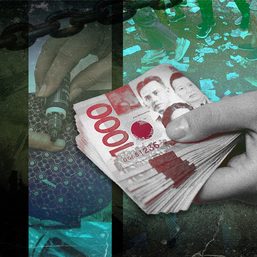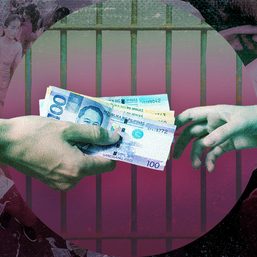SUMMARY
This is AI generated summarization, which may have errors. For context, always refer to the full article.
![[Newspoint] Take the money, then ‘vote your conscience’](https://www.rappler.com/tachyon/2021/11/TL-take-money-vote-conscience-November-5-2021.jpg)
Vote buying has been going on unpunished for as long as I can remember, from even before I became eligible to vote, in the late sixties. The problem appears to lie more with the law than with its enforcement. The law is so inherently ineffectual even properly zealous enforcers can do nothing to make it work – not that properly zealous enforcement of the law, of any law, is a virtue with us.
Anyway, if it is indeed the case, that we’re unable to protect the sanctity of the vote, unable to guarantee the freedom of its exercise, then we’re living in a sham democracy. But who cares?
Well, Jaime Cardinal Sin did care. Take the money, then “vote your conscience,” he counseled the nation in the snap presidential election of 1986, a contest between Ferdinand Marcos, the sitting, murdering, plundering dictator, and Corazon Aquino, widow of Marcos’s arch rival, Ninoy, who had been assassinated three years before, upon returning from exile.
One cannot know for sure that the cardinal’s counsel was heeded to any degree, but some hint might be taken from what happened next. Not one to take any chances, Marcos had the vote count falsified and had himself proclaimed winner, provoking street protests that brought him down from power and drove him and his family into foreign exile.
Now Cardinal Sin is being echoed by Leni Robredo, the only strictly legitimate opposition candidate for president in the May 2022 elections. She is up against, among other rivals, Ferdinand Marcos Jr, whose war chest is seen precisely as the chief source of his electoral strength: he is an heir to a loot, estimated at billions of dollars, his family amassed during its 20 years in power. It must be his candidacy that has made vote buying the particularly fiery issue that it is today.
Nearly all of Robredo’s other rivals happen to be of the same persuasion, more or less, as the Marcoses. Of the more-known ones, two are such open admirers of Ferdinand Sr.’s they are at pains to promote what slightest redeeming aspect of his presidency they can find, and a third was in fact a notorious intelligence agent and interrogator of his martial-law regime. None of them – Ferdinand Jr. included, ludicrously odd as that may seem – can escape Robredo’s challenge. In fact, they have no decent democratic choice but to go along with her on it. After all, her challenge champions free vote, and free vote goes into the very essence of democracy, the ideal to which we have been pretending all these three quarters of a century.
Voter is victim
Take the money, then vote your conscience – nothing could be more sensible and righteous and democratic, indeed. The law is not only ineffectual, but, precisely because it is ineffectual, it tends to encourage the very crime it is supposed to punish and, worse, to conscienticize instead the wrong party – the voter, a veritable victim.
Surely, no voter takes that kind of money who can afford not to. And that is an especially painful and scandalous reality at this time of untold suffering and death and privation. With a government too inept or too corrupt to be any help in this pandemic, the law against vote buying becomes itself the crime.
But James Jimenez is adamant, as only expected perhaps of the official spokesman of the Commission on Elections. The law is the law, he inflexibly pronounces on television as a guest invited to a discussion of the issue. By taking money for vote, one becomes “complicit” in the crime, he says, provoking a text message from a viewer to the program host, who reads it to Jimenez.
What crime! protests the text, and proceeds thus (I’m paraphrasing): Taking the money makes a perfectly fair sense of justice if it’s done with the intention of making the candidate pay for a vote he will not get.
Jimenez could just have let the remark pass and saved himself from sinking right where he stands – or sits, rather, in the television studio, virtually, although in full view of a prime-time audience all the same. But he, instead, chooses to dig in and continue to miss the forest of moral philosophy for one stupid, heartless tree of legality. – Rappler.com
Add a comment
How does this make you feel?



![[New School] Tama na kayo](https://www.rappler.com/tachyon/2024/02/new-school-tama-na-kayo-feb-6-2024.jpg?resize=257%2C257&crop=290px%2C0px%2C720px%2C720px)
![[Only IN Hollywood] After a thousand cuts, and so it begins for Ramona Diaz and Maria Ressa](https://www.rappler.com/tachyon/2024/02/Leni-18.jpg?resize=257%2C257&crop=262px%2C0px%2C720px%2C720px)



![[Newspoint] Improbable vote](https://www.rappler.com/tachyon/2023/03/Newspoint-improbable-vote-March-24-2023.jpg?resize=257%2C257&crop=339px%2C0px%2C720px%2C720px)

There are no comments yet. Add your comment to start the conversation.